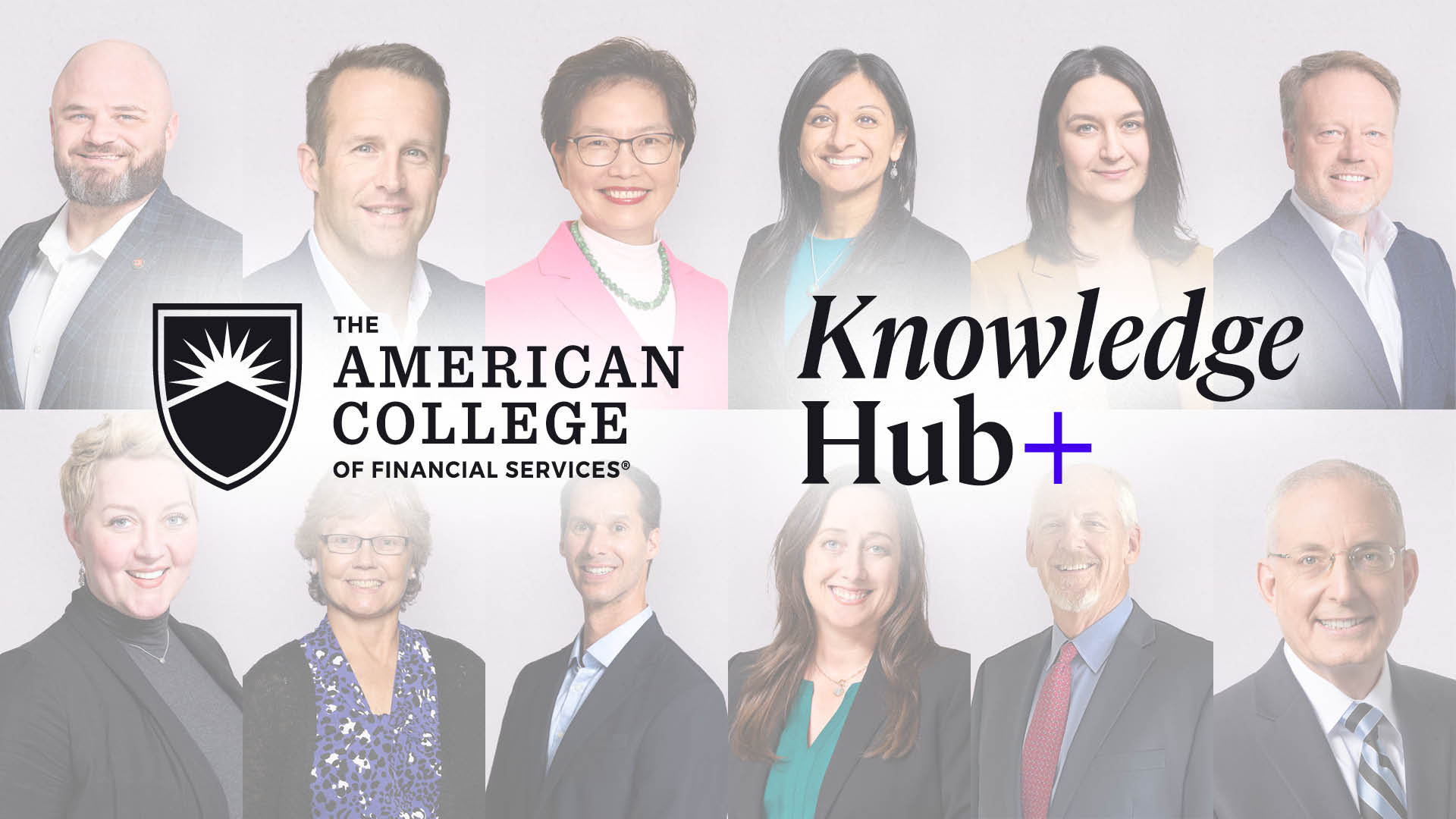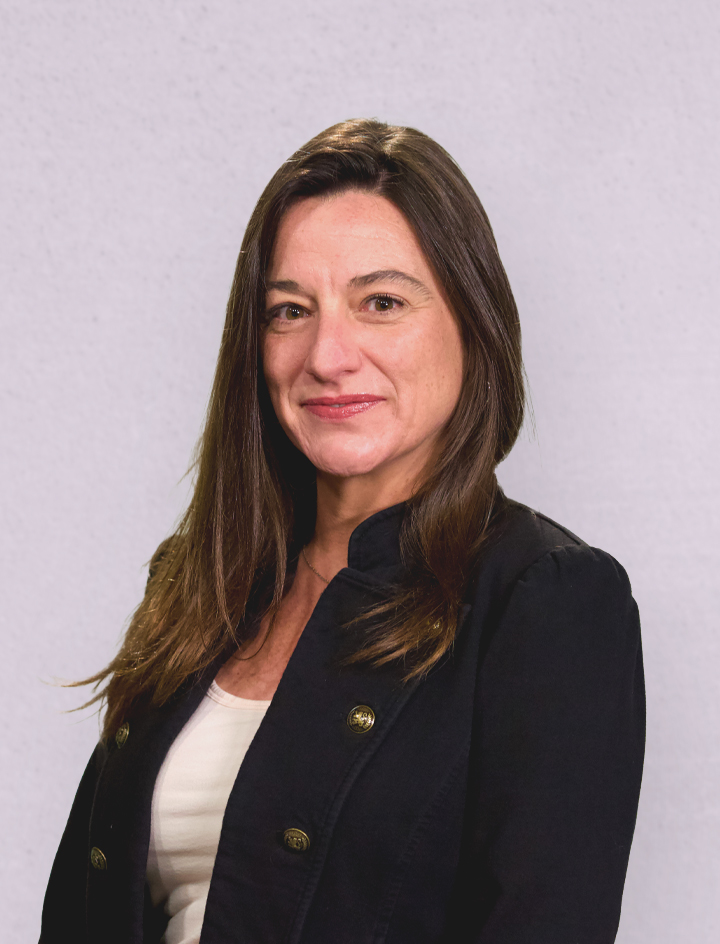
Alisha Cook
Author
Subscribe to Newsletter
Related Posts
News Roundup: December 2025
View DetailsThe Future of Advice
View DetailsAbout The College News
College News Roundup Week of June 3 2024
Kitces.com | The Latest In Financial #AdvisorTech
June 3, 2024
Financial guru Michael Kitces discusses The College’s partnership with Couplr.AI and how it benefits College alumni as well as the health of prospecting in the industry.
ThinkAdvisor | A Conversation with American College of Financial Services Researchers Kaylee Ranck & Eric Ludwig
June 4, 2024
Director of College research Kaylee Ranck, PhD, and RICP® Program Director Eric Ludwig, PhD, CFP® discuss results from The College’s 2023 Retirement Income Literacy Study along with approaches to research in the field as a whole.
ThinkAdvisor | American College to Roll Out Tax Planning Certification
June 5, 2024
Jeffrey Levine, the industry thought leader behind The College’s upcoming Tax Planning Certified Professional™ (TPCP™) Program, discusses how the program will enhance the advice of advisors across fields of expertise.
InvestmentNews | A Philosophical Lesson in Servant Leadership
June 6, 2024
In recognition of College President and CEO George Nichols III, CAP®’s position as a finalist for the InvestmentNews CEO of the Year Award, this profile looks at President Nichols’ background and where his drive to benefit the industry and society comes from.
ThinkAdvisor | 8 Reasons Retirement Has Gotten Harder for the Affluent
June 6, 2024
WMCP® Program Director Michael Finke, PhD, CFP® explores why those with more resources may still face difficult years when entering retirement.
ThinkAdvisor | Why Advisors Love the Retirement Planning Field
June 7, 2024
Director of College research Kaylee Ranck, PhD, and RICP® Program Director Eric Ludwig, PhD, CFP® speak with ThinkAdvisor about how they came from disparate backgrounds and became researchers in the retirement planning space.

MBA, Series 7, Series 66, CFP®
Author
Subscribe to Newsletter
Related Posts
News Roundup: December 2025
View DetailsThe Future of Advice
View DetailsRepresentation Insights
Military Support Groups

In 2004, Troopathon, formerly known as Move America Forward, was founded by Melanie Morgan as a nonprofit organization with a mission to provide emotional and tangible support to active-duty troops as well as offer assistance and resources to military families and veterans in need. Since its founding, Troopathon has sent over 1,000 tons of care packages to troops on the frontline thanks to the unwavering support of thousands of pro-troop civilians, veterans, and military families nationwide.1
The organization hosts an annual Troopathon fundraiser, which is the largest and only nationally televised annual care package telethon. It aims to send as many military care packages as possible to our troops on the front lines.
Troopathon provides numerous opportunities to get involved including donating, volunteering, and spreading awareness.
Author
Alisha CookSubscribe to Newsletter
Related Posts
News Roundup: December 2025
View DetailsThe Future of Advice
View DetailsRepresentation Insights
Generation Z Employment Insights Survey

With months of dedicated research and design, Wright Research Fellow Alisha Cook and director of research Kaylee Ranck, PhD, have developed a strong foundation for understanding the career interests and intricacies of the next and upcoming generation of financial professionals, Generation Z. As the financial services industry evolves, understanding and harnessing the potential of these emerging professionals becomes paramount for the future success of institutions and the clients they serve.
The survey aims to understand the career interests, experiences, and preferences of Gen Z individuals (aged 18-27), who are either interested in or already within their first three years of a career within the financial services industry. It covers a range of critical topics including but not limited to:
Career interests and experiences
Perceptions of the financial services industry
Financial literacy, digital skills and AI adaptiveness
Career advancement goals and aspirations
Consisting of over 40 questions and around 15 minutes in length, the survey dives deep into the minds of Gen Z, capturing the nuances of their career motivations and expectations. Participants' involvement will have no foreseeable risks and responses will remain anonymous, ensuring their safety and confidentiality.
By participating in this survey, Gen Z professionals will provide critical insights that can help shape the future of the financial services industry. These insights will empower institutions to tailor their recruitment and retention strategies more effectively, aligning them with the expectations and needs of young professionals.
We invite all eligible Gen Z individuals to share their perspectives and contribute to this important research. This survey will provide valuable data that can help shape the future of financial services, ensuring that it remains responsive to the next generation of talent. To participate, simply click the link below:
https://theamericancollege.qualtrics.com/jfe/form/SV_d4IBCrNvFQvXefA

Author
Lindsey LewisSubscribe to Newsletter
Related Posts
News Roundup: December 2025
View DetailsThe Future of Advice
View DetailsRepresentation Insights
Women Working in Wealth on the Road for Women's History Month

The InvestmentNews Women Advisor Summit provided a unique platform for advisors and their supporters to explore the latest industry trends, practice management strategies, and career development opportunities. The American College of Financial Services, serving as the education partner, was proud to contribute its expertise to this talented group of financial professionals.
Returning from the summit, attendees, including myself, felt inspired and equipped with practical ideas, new tools, and invaluable connections with peers and industry leaders. Some of the key lessons that resonated with me included the following:
- The practice of a financial professional is to become a translator and speak the language of your clients
- Spend the time getting to know your clients during all seasons of life and put in the reps to develop a rapport with clients
- Organic growth aside from M&A takes concentrated effort
At the Wealth Management EDGE conference, discussions centered on the future of diversity, equity, inclusion, and belonging (DEIB) in the industry. Representing The College, I had the privilege to discuss how the industry can increase awareness and accessibility for diverse communities. Addressing the obstacles that hinder entry into the financial services industry and ensuring firms retain and invest in diverse talent is crucial.
As the financial services industry continues to evolve, embracing diversity and fostering an inclusive environment will be key to its sustainability and success. By engaging with passion and committing to DEIB principles, the industry can ensure a bright and equitable future for all professionals and clients. Read more about the discussion here.
Author
Subscribe to Newsletter
Related Posts
News Roundup: December 2025
View DetailsThe Future of Advice
View DetailsRepresentation Insights
Military Resource Group Consortium’s First Quarterly Webinar

On June 6, the Center for Military and Veterans Affairs’ Military Resource Group Consortium hosted its first free hour-long webinar featuring panelists from various tribes in the financial services industry. The webinar began with each panelist describing their transition from the military into the industry and highlighting the opportunities and challenges they each experienced. They continued by discussing the educational opportunities they each took advantage of and how it has led to their success in the industry.
Each panelist delved into which hard and soft skills learned in the military they believe are most transferable to the industry. “In the military you learn how rules and regulations work and how to apply and live by them, but you also learn humility which will come when helping clients navigating life,” said Daniel Kopp of Wise Stewardship Financial Planning.
Matt Stephens of Willow Chute Financial also felt that the military provided him with valuable skills that he has transferred to financial services. “You learn how to ask pointed specific questions and network well, which strengthens your influence,” Stephens said.
Christopher Smiley stated his belief that the regimented environment prepared him for success in financial services as well, “In the military you are always used to having a manual that helps you build efficiency; you can build efficiency and discipline into financial practices.”
In total, the webinar had 57 registrants with many scholars from the Center for Military and Veterans Affairs and members from each consortium’s company resource group in attendance.
The consortium will be hosting its next webinar during the 2024 Military Summit.
Author
Subscribe to Newsletter
Related Posts
News Roundup: December 2025
View DetailsThe Future of Advice
View DetailsAbout The College Press
The American College of Financial Services Launches Knowledge Hub Plus CE Platform to All Financial and Nonprofit Professionals

KING OF PRUSSIA, PA – June 11, 2024 – Today marks a significant milestone for financial education as The American College of Financial Services proudly unveils the public launch of Knowledge Hub+, an innovative learning platform delivering valued and valuable continuing education (CE) to help financial and nonprofit professionals increase their knowledge and better serve their clients. Exclusive to The College's alumni in the Professional Recertification Program since January, this resource is now accessible to all as a subscription-based service, empowering learners to achieve more.
"Knowledge Hub+ embodies our commitment to continuous education and professional growth," remarked George Nichols III, CAP®, president and CEO of The American College of Financial Services. "In today's fast-paced landscape, where expertise is paramount, this platform emerges as a beacon of timely, indispensable, and actionable knowledge."
Featuring an array of learning modules spanning eight key focus areas, Knowledge Hub+ caters to the evolving needs of financial practitioners as well as those looking for more robust financial information. From financial planning to ethics in financial services, subscribers can delve into a wealth of insights meticulously curated to enhance their proficiency. With the public launch, the platform showcases over 60 hours of College and CFP Board-approved learning, automated CE reporting, fresh content delivered monthly by industry luminaries and quarterly live webcasts exclusively for subscribers.
"Many pressing challenges are impacting the financial security of Americans that both financial services and nonprofit professionals are working to solve," said Joellen Meckley, JD, MHS, ChSNC®, executive director of the American College Center for Special Needs. "With Knowledge Hub+, we're not just providing knowledge to solve those challenges; we're catalyzing real-time advancements in professional practice."
As financial landscapes evolve, so must the tools available to navigate them. Knowledge Hub+ arrives as a timely solution. From foundational principles to cutting-edge insights, this platform empowers learners to excel across eight vital areas:
- Financial Planning
- Retirement Planning
- Wealth Management
- Insurance and Risk Management
- Advanced Planning
- Philanthropic Planning
- Practice Management
- Ethics in Financial Services
Knowledge Hub+ boasts an impressive lineup of industry experts, ensuring learners receive guidance from the best minds in the field. From distinguished academics to seasoned practitioners, this platform curates insights from luminaries including Michael Finke, PhD, CFP®, and Jamie Hopkins, Esq., LLM, CFP®, ChFC®, CLU®, RICP®, among others.
"The caliber of expertise within Knowledge Hub+ is unparalleled," said Jared Trexler, The College’s senior vice president and chief marketing and strategy officer. "We're proud to provide a platform where professionals can access the insights they need to thrive in an ever-changing profession."
The platform for applied knowledge includes valuable continuing education from the following industry experts.
The American College of Financial Services Academics:
- Chet R. Bennetts, CFP®, ChFC®, CLU®, RICP®, CLF®
- David Blanchett, PhD, MSFS, CFA, CLU®, ChFC®, CFP®
- Chia-Li Chien, PhD, CFP®, PMP®, CPBC
- Sophia Duffy, JD, CPA, AEP®
- Azish Filabi, JD, MA
- Michael Finke, PhD, CFP®
- Timi Joy Jorgensen, PhD
- James Karthaus, MA, CFP®, CLU®, ChFC®
- Jennifer Lehman, PhD, JD, CFP®, CAP®
- Eric Ludwig, PhD, CFP®
- Joellen Meckley, JD, MHS, ChSNC®
- Steve Parrish, JD, RICP®, CLU®, ChFC®, AEP®
- Ed Slott, CPA
Industry Innovators, Experts, and Practice Management Leaders:
- Dave Alison, CFP®, EA, BPC – C2P Enterprises
- Denise Appleby – Appleby Retirement Consulting
- Ian Berger, JD – Ed Slott and Company, LLC
- Sarah Brenner, JD – Ed Slott and Company, LLC
- Don Graves, RICP®, CLTC® - Housing Wealth Institute
- Philipp Hecker - Bento Engine
- Adam Holt, CFP®, ChFC® - Asset-Map
- Jamie Hopkins, Esq., LLM, CFP®, ChFC®, CLU®, RICP® - Bryn Mawr Trust, Income Lab, and FinServ Foundation
- Andy Ives, CFP®, AIF® - Ed Slott and Company, LLC
- Robert S. Keebler, CPA/PFS, MST, AEP (Distinguished), CGMA - Keebler & Associates, LLP
- Jeffrey Levine, CPA, PFS, CFP®, RICP®, ChFC®, CWS, AIF, BFA™ - Buckingham Strategic Wealth
- Rick McClanahan - National Association of Certified Financial Fiduciaries, LLC
- Alex Murguia, PhD – RISA
- Wade Pfau, PhD, CFA, RICP® - RISA
- Tina Powell - Intention.ly
- Fred Reish, JD
- Tyrone V. Ross, Jr. - 401 Financial
- Heather Schreiber, RICP®, NSSA® - HLS Retirement Consulting
- Matt Seitz – C2P Enterprises
- Jason L. Smith, CEP®, BPC – C2P Enterprises
- Deirdre Van Nest - Crazy Good Talks
- Kelly Waltrich - Intention.ly
The list of participating experts on Knowledge Hub+ keeps expanding with live quarterly virtual events and new content added monthly. Learn how to expand your opportunities with Knowledge Hub+.
###
ABOUT THE AMERICAN COLLEGE OF FINANCIAL SERVICES
Founded in 1927, The American College of Financial Services is the nation’s largest nonprofit educational institution devoted to financial services professionals. Holding the highest level of academic accreditation, The College has educated over 200,000 professionals across the United States through certificate, designation, and graduate degree programs. Its portfolio of applied knowledge also includes just-in-time learning and consumer financial education programs. The College’s faculty represents some of the foremost thought leaders in the financial services industry. Visit TheAmericanCollege.edu and connect with us on LinkedIn, Twitter, Instagram, Facebook, and YouTube. Discover all the ways you can expand your opportunities with us.
Contact
Sarah Tremallo
908-967-0381 / Stremallo@jconnelly.com
Lindsey Allumbaugh
678-643-1310 / Lindsey.allumbaugh@theamericancollege.edu

EdD